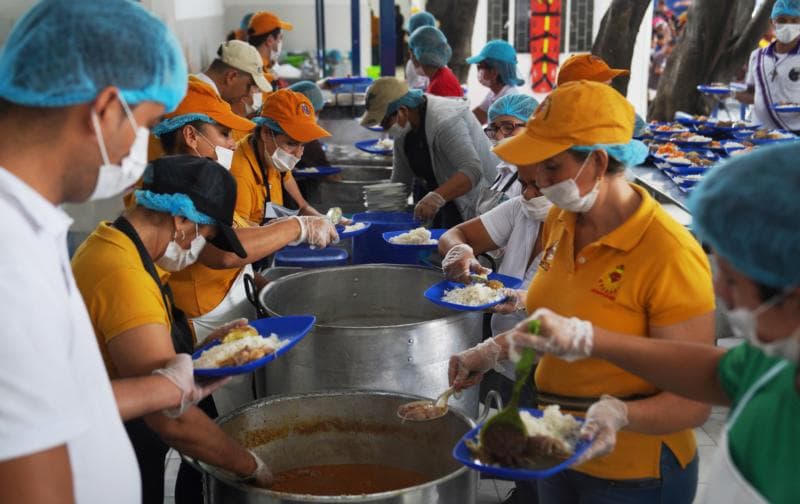CUCUTA, Colombia — As the midday heat starts to kick in, hundreds of people line up outside the Divine Providence food pantry to receive a meal of chicken, beans and rice.
Most are Venezuelan migrants who work in the city’s streets for just a few dollars per day. For them, the free meal marks the difference between staying healthy or risking malnutrition.
“We started in March of 2017, serving people out of a single pot,” said Father David Canas, the food pantry’s manager, showing around a delegation of donors. “Now we can feed up to 6,000 people per day.”
The massive food pantry helps thousands of Venezuelans who cross into Colombia each day for work, or just to get food, as their country goes through an unprecedented humanitarian crisis caused by a collapsing economy, violence and political repression.
The program has received several awards and turned Canas into one of Colombia’s most renowned aid workers.
“I had never done something like this before,” the 43-year-old priest said. “But God has given me the grace to administer this, and our church is working hard to take care of our Venezuelan brothers.”
Canas said his efforts to help migrants started three years ago, as Venezuelans started to arrive in Colombia in large numbers.
Back then, he was in charge of ministering to members of church associations, like the Legion of Mary, and was also the priest in charge of tending to merchants in this border city.
With a few volunteers, Canas set up a tent outside a small church located just a few blocks from the border with Venezuela. Within half an hour, the food they had cooked was gone, as dozens of needy migrants sought a free meal.
“A family asked us for the pot, and we thought it was because they wanted to help wash it,” Canas recalled. “Instead they started to scrape it for leftovers. That’s when we realized that something more had to be done here.”
Canas’s effort to feed migrants soon evolved from free meals once a month to a permanent food pantry that was set up with funding and logistical support from the Diocese of Cucuta.
As the Venezuelan migrant crisis has grown, the food pantry has expanded, and volunteers have gone from cooking with firewood on battered pots to using industrial-scale equipment that meets strict safety standards.
Today the Divine Providence center cooks about three tons of food per day. Rotating crews of dozens of volunteers help serve and prepare the meals.
“Most of the food you see here has been donated by the people of Cucuta,” said the priest, who has used his connections with the city’s merchants to garner donations.
He said he also receives help from international donors, including the U.N. High Commissioner for Refugees, which helped to build bathrooms; the World Food Program, which pays for some staffers; and the U.S. Conference of Catholic Bishops, which has helped to purchase cooking equipment.
The pantry also has sent food to Venezuela via bishops and priests from that country who visit, as humanitarian agencies struggle to deliver supplies to Venezuela, because the government is wary of international aid.
Canas said that as long as there are people with needs on the border, the church will continue to feed them. He runs a complex operation now, but said that it all began from a simple idea.
“This is a labor of faith,” he said. “It is the church fulfilling its mission to help the poor.”
Crux is dedicated to smart, wired and independent reporting on the Vatican and worldwide Catholic Church. That kind of reporting doesn’t come cheap, and we need your support. You can help Crux by giving a small amount monthly, or with a onetime gift. Please remember, Crux is a for-profit organization, so contributions are not tax-deductible.










